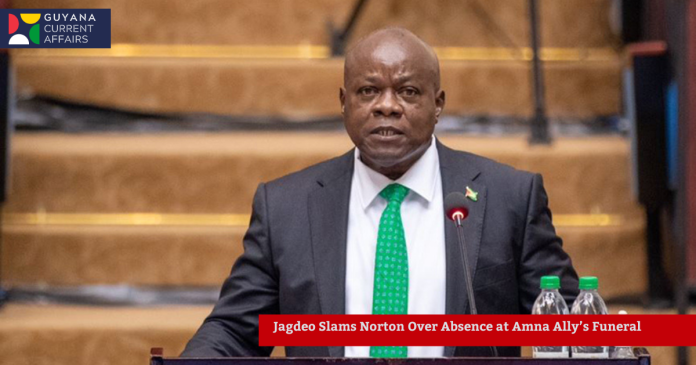Vice President Bharrat Jagdeo has sharply criticized Opposition Leader Aubrey Norton for his decision to boycott the funeral of veteran politician Amna Ally, calling into question Norton’s leadership and sense of statesmanship.
Speaking at a press conference on Thursday, Jagdeo did not mince words as he addressed Norton’s absence from the high-profile service, which drew political leaders, dignitaries, and members of the public from across the country. “What kind of leader are you, that you can’t put aside politics, even for a moment of national mourning?” Jagdeo asked, his tone reflecting both disappointment and frustration.
Amna Ally, a long-serving executive of the People’s National Congress Reform (PNCR) and former Minister of Social Protection, was widely respected for her decades of public service and her efforts to bridge political divides. Her funeral was seen as not only a moment of personal loss for her family and party, but also a national occasion for unity and respect.
Jagdeo argued that Norton’s decision to stay away sent the wrong message to the nation, especially at a time when Guyana is grappling with deep political polarization. “Leadership is about rising above personal and partisan differences, especially during moments that call for solidarity and respect. By boycotting the funeral, Norton failed to demonstrate the maturity and empathy that our country needs from its leaders,” Jagdeo stated.
The Vice President’s remarks have sparked debate across the political spectrum, with some defending Norton’s right to make personal choices and others echoing Jagdeo’s call for greater statesmanship. Within the PNCR, some party members privately expressed disappointment at Norton’s absence, noting that Amna Ally had played a pivotal role in mentoring younger politicians and fostering dialogue across party lines.
Norton has yet to respond publicly to Jagdeo’s criticism or to explain his reasons for not attending the funeral. However, the controversy has reignited discussions about the responsibilities of political leaders to set examples of unity and respect, even in the face of deep-seated differences.
As Guyana continues to navigate its complex political landscape, the episode serves as a reminder of the importance of leadership that transcends partisanship, especially in moments of national significance.


